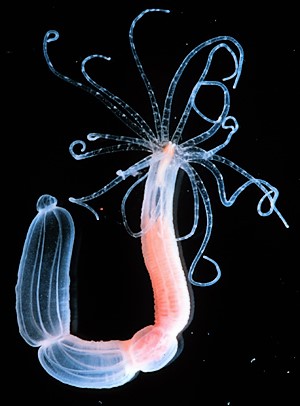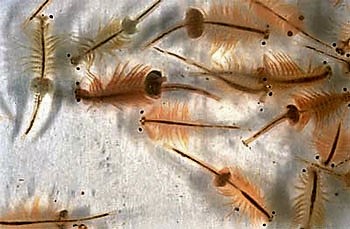The University of Washington Bothell campus may be under restricted operation orders during the coronavirus pandemic, but the sea anemones in Professor Marc Servetnick’s research project still need to be fed.
“You can’t really stop taking care of them when everything else is put on pause,” he said.
Embryonic evolution

Servetnick has been researching embryonic development since graduate school and previously studied sea urchin and frog embryos. One reason he turned to sea anemones (Nematostella vectensis) when he arrived at UW Bothell in 2008 is that the University does not use vertebrates as test animals.
Servetnick does not kill the sea anemones. He studies the embryos and how genes that regulate development have changed over evolutionary time.
The anemones can be induced to spawn about every six weeks to produce the embryos needed for study.
“Most of the genes in humans are also present in sea anemones,” he said, “and some of those genes are used for a similar process.”
Each sea anemone is just a couple of inches in size. Servetnick has hundreds of them in 40 or 50 glass bowls kept in an incubator, which looks like a refrigerator. The anemones are fed brine shrimp, which must be hatched. Sometimes called sea monkeys, they are commonly sold for fish aquarium food.
Caring for Nematostella vectensis

An undergraduate research student who works with Servetnick, Shahrzad Tehrani, has been caring for the anemones in a Beardslee Building lab since September when Servetnick became acting dean of the School of STEM.
It takes less than an hour to set up a brine shrimp culture, maybe an hour or two for the feeding and an hour or two to clean the bowls after feeding. But each must be done on a different day, Servetnick said.
Tehrani uses a pipette dropper to transfer the tiny brine shrimp into the bowls. She also offers minced pieces of oyster.
“I place one piece in front of each anemone,” she said. “They use their tentacles to grab onto it almost immediately.”
Tehrani, a second-year student majoring in Biology and in Science, Technology & Society, has been working in Servetnick’s lab for more than a year now, learning molecular biology methods and gaining “a better sense of what a career in research could look like.”
Now that Leslie Cornick has been named the new STEM dean, effective July 1, Servetnick, the chair of the Division of Biological Sciences, says he can again take a more active role in the research.
Research during restrictions
Carolyn Brennan, assistant vice chancellor for research, supports research operations at UW Bothell and reports that exemptions to campus access restrictions follow UW guidelines for mitigating impacts. Researchers still must follow safety and social distancing requirements.
Servetnick’s research is just one of several projects approved as essential work during this time, she said. Other researchers with exemptions include Dan Jaffe, a professor of environmental chemistry, and Hyung Kim, an assistant professor of physical sciences.
A member of Jaffe’s research team needs to analyze volatile organic compounds that were collected in Houston in a novel method of detecting traces of wildfire smoke. Kim and his research team are involved in time-sensitive studies of the metabolism of nitric oxide by a family of specific proteins — one in a lung infecting pathogen, which is a very pertinent research topic.
It’s not as visible during remote operations, but many UW Bothell faculty members are continuing research, she added.
“There’s important work happening, even though we’re not on campus. People are crunching data at home. They’re drafting articles for publication. They’re doing analysis,” Brennan said. “Faculty are still doing great work in this unprecedented time.”



